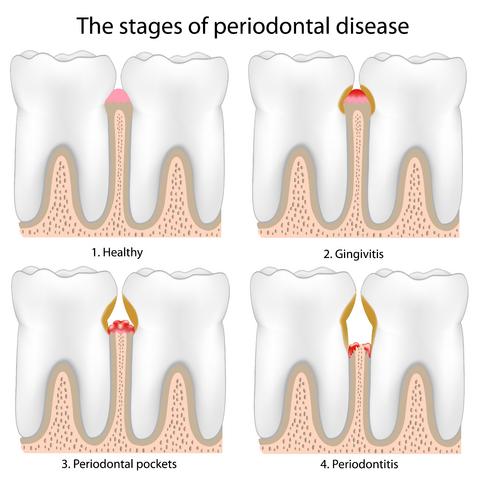
Periodontal Disease
The wonderful thing about all of the advances in dentistry is that we are all able to keep our teeth for a lifetime.
Part of ensuring that your teeth are around when you need them is taking proper care of your gums. Without healthy gums, teeth get loose, we experience bleeding and bad breath, and we can notice effects on our health like heart problems and diabetes.
Our mouths are the entry point in our bodies to all the other systems. If we have infection in our mouths, the bacteria gets into the bloodstream and is constantly circulating throughout the body. There are many studies now correlating gum disease to complications with diabetes because bacteria get into already compromised blood vessels and circulation. Cardiac physicians are also paying more attention to the health of their patients’ mouths, because bacteria in the blood stream can cause serious cardiac issues.
Tooth brushes and floss manage plaque above the gums, but are only able to penetrate 1-2 mm below the gums to clean. Within 24 hours, any plaque you leave on your teeth turns into tartar (hard plaque) which can no longer be removed without help from your friendly hygienist. Bacteria move into the tartar and act like barnacles on the side of a boat. They provide a surface that is irritating and rough to the gums. Gums swell and get inflamed and try to move away from the barnacle. This starts a retraction of the gum down the root.This is a major problem because exposed roots can be sensitive to temperature and touch, annoy us when we are trying to eat or drink, and are softer and more prone to damage from tooth brushing. There is no enamel on roots!
It takes on average three months for the bacteria to produce enough toxic material around the tooth to start to dissolve the bone. This is why, if you are diagnosed with periodontal disease, your hygienist will prescribe cleaning for you on a three month basis for advanced disease, four months for moderate disease and 6 to 12 months for early disease or gingivitis.


How do we decide whether you have periodontal disease?
There are a number of indicators of periodontal disease. When we examine you we are looking at the following things in terms of your gums:
How much plaque is present on your teeth?
The amount of plaque on your teeth gives us an idea of how much bacteria we are dealing with in your mouth
How much bleeding is there when we touch your gums?
Healthy gums don’t bleed! Bleeding indicates that there are bad bacteria in the pockets around your teeth which can dissolve bone.
Are there pockets around your teeth and how deep are they?
Pockets are the spaces between your gums and your teeth. Normal pocket depths around teeth range from 1-3mm. Depending on the amount of bleeding, 4-5mm pockets would indicate early to moderate disease, and 6-7mm pockets with bleeding indicate advanced disease.
Are your teeth loose?
If bone is lost around a tooth due to gum disease it becomes mobile, like a fence post in a shallow hole. You may notice that mobility while chewing or pushing on the tooth. During the active disease process, the gums are boggy and inflamed and there is continual and gradual loss of bone support, eventually resulting in pain and tooth loss.
Do you have recession? If yes, how much bone has already been lost?
Recession can be a result of aggressive brushing, or the result of active or healed gum disease. Our job is to figure out which it is. If it is due to brushing, we can teach you new, gentler brushing techniques. Active gum disease requires treatment planning and some time with our hygienist. Healed gum disease sometimes presents as recession. We can’t get into deep pockets at home. With good periodontal scaling and root planing the roots become smooth and bacteria free, the gums get pink and healthy, and swollen gums shrink and heal. The result of this is that we get some recession, but this is better than having a pocket we can’t clean! With your help, we can maintain stable healthy gums for a lifetime.
Gum disease is a silent killer. Most often patients have no idea that they have it because until the late stages there is little or no pain.
Come and see what is happening beneath your skin!
